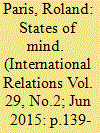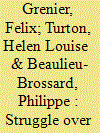|
|
|
Sort Order |
|
|
|
Items / Page
|
|
|
|
|
|
|
| Srl | Item |
| 1 |
ID:
140109


|
|
|
|
|
| Summary/Abstract |
Recent ideational accounts of twentieth-century decolonization, one of the most important but least studied transformations in world politics, have highlighted the significance of mechanisms like principled beliefs and ethical arguments for explaining the triumph of norms and ideas like racial equality, human rights and self-determination and their role in ending colonialism. In this article, I engage with this body of literature and highlight, through a discussion of Britain and its reaction to Indian calls for self-determination from 1929 to 1935, that explanations that rely on the importance of the adoption and internalization of these norms and ideas by the colonizer and their subsequent extension to the colonized may miss certain critical elements at the heart of these colonial empires. Specifically, this article argues that metropolitan identities had a significant role in constraining and shaping the approaches of elite British policymakers when they were forced to respond to challenges to their colonial rule in India. Critically, this article also seeks to trace how change happens, by examining and discussing the processes, mechanisms and politics involved in the contestation of the dominant identity important to maintaining colonialism and the emergence of an alternative metropolitan identity.
|
|
|
|
|
|
|
|
|
|
|
|
|
|
|
|
| 2 |
ID:
140111


|
|
|
|
|
| Summary/Abstract |
Although the privatisation of military support is increasingly widespread, advanced military organisations have not relied on Private Military and Security Companies (PMSCs) to the same degree. The existing scholarship on PMSCs cannot explain why countries sharing similar material incentives and similar market and political ideologies like the United States and the United Kingdom have not outsourced the same operational tasks. This article contends that introducing military role conceptions as a factor enabling or inhibiting the outsourcing of certain functions provides important insights into the scope of military privatisation, explaining why the US military has systematically privatised armed security and foreign military training, while the UK military has not
|
|
|
|
|
|
|
|
|
|
|
|
|
|
|
|
| 3 |
ID:
140104


|
|
|
|
|
| Summary/Abstract |
How do foreign actors involved in ‘regime change’ decide which kinds of domestic governance structures to promote in place of the regimes they have deposed? Most of the literature on foreign-imposed regime change assumes that interveners make such decisions based on rational calculations of expected utility. This article, by contrast, contends that interveners are predisposed to promote political arrangements that correspond to their own governance ‘schemas’, or taken-for-granted assumptions about the nature of political authority. These patterns are examined in relation to the US-led regime-change invasions of Afghanistan and Iraq. In both cases, the interveners appeared to be guided – and partially blinded – by their own governance schemas. Yet, if schemas have these effects, they should also be visible in cases where interveners held very different assumptions about governance and the ‘state’ than those held by US officials in Afghanistan and Iraq. To probe this possibility, this article also examines an older, non-Western case of intervention – the Mongol invasion and occupation of northern China in the thirteenth century – a case that yields similar results and highlights the need for additional historical research in this field.
|
|
|
|
|
|
|
|
|
|
|
|
|
|
|
|
| 4 |
ID:
140112


|
|
|
|
|
| Summary/Abstract |
Since the inception of International Relations (IR) within university departments, its disciplinary status has been the subject of constant debate. Yet, the current literature on ‘the state of the discipline’ silences this debate either through IR’s assumed disciplinarity or conflation of debates about theory with the existence of IR. This Forum moves beyond this literature by explicitly engaging whether IR is a discipline or not and by enquiring how this status matters. Contributors rely on the sociology and philosophy of social science to call into question or affirm the disciplinarity of IR to argue whether IR is as a subfield of Political Science, a full-blown and autonomous discipline, or a hybrid field of interdisciplinary studies. Furthermore, contributors reveal the implications of the different disciplinary statuses regarding the academic institution, interdisciplinary possibilities and modes of organizing IR. Overall, these contributions aim to engage rather than close the disciplinary debate, creating further space for reflection.
|
|
|
|
|
|
|
|
|
|
|
|
|
|
|
|
| 5 |
ID:
140110


|
|
|
|
|
| Summary/Abstract |
Turkey’s policy-makers have historically aimed to position Turkey within the West by convincing the latter that Turkey meets the ‘standards’ of the West, that they ‘are not barbarians’. This article aims to offer a gender analysis of Turkey’s relations with the West by showing how ‘devalorization’ as feminization and hypermasculinization of the non-West becomes a source of insecurity for non-Western policy-makers. This gendered ontological insecurity is intensified when they face a military threat from a third party. The argument is that Turkey’s policy-makers try to benefit from military crises in order to represent Turkey as a state meeting Western ‘standards’ of masculinity, and therefore to address its gendered ‘devalorization’. The analysis aims to contribute to the literatures of postcolonial feminism and non-Western insecurities.
|
|
|
|
|
|
|
|
|
|
|
|
|
|
|
|
|
|
|
|
|